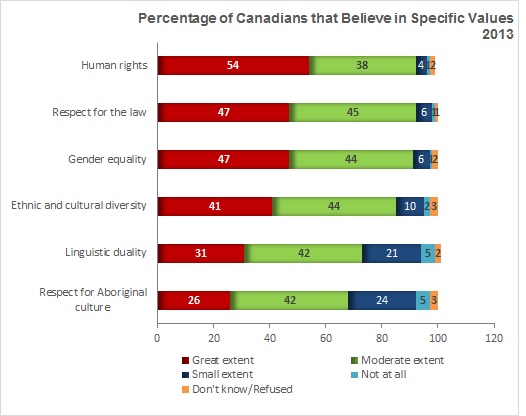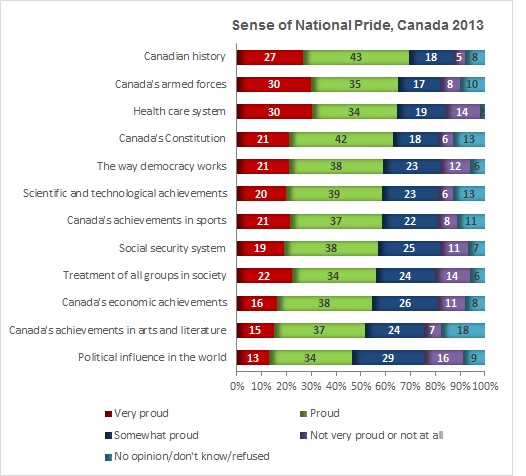For additional information relating to this article, please contact:
October 01, 2015CANADIAN IDENTITY, 2013 The 2013 General Social Survey collected information on Canadians' perceptions of national identity, looking at three dimensions of identity: national symbols, shared Canadian values and pride.

Among the five symbols measured, the Canadian Charter of Rights and Freedoms (93%) and the national flag (91%) ranked the highest, with more than 9 in 10 Canadians stating that these symbols were either very or somewhat important to national identity. Next highest ranked symbols were the national anthem (88%), the Royal Canadian Mounted Police (87%) and hockey (77%).

In 2013, the majority of people believed that Canadians collectively share the value of human rights (92%), respect for the law (92%), gender equality (91%). While most people also felt that Canadians collectively shared the other three values: ethnic and cultural diversity (85%), linguistic duality (73%) and Aboriginal culture (68%), the proportions were somewhat lower.
Strong belief in shared values decreased with age. Before age of 25, 53% of people strongly believed that Canadians valued ethnic and cultural diversity, decreasing to 44% among those aged 35 to 44, and 26% among seniors aged 75 and older.

Nearly 9 in 10 individuals were proud to be Canadian, but pride was somewhat lower for Canadian achievements. Almost three quarters of Canadians (70%) were proud of Canadian history, making it the achievement with the highest ranking. The armed forces (65%), the health care system (64%), and the Canadian Constitution (63%) were also among the top-ranked achievements. Canada's political influence in the world, at 47%, as well as Canada's achievement in arts and literature (52%) had the lowest levels of pride.
Perceptions of Canadian identity varied by region and socio-demographic characteristics. Residents of Newfoundland and Labrador were among the most likely to feel that national symbols were very important to the Canadian identity, with more than three-quarters of residents strongly associating the Charter, flag, national anthem and the RCMP with national identity. Quebec residents were the least likely to strongly identify symbols as very important to the national identity, although 53% of Quebecers believed the charter was very important. They also had lower levels of pride in being Canadian and in Canadian achievements, compared with people living elsewhere in Canada.
Aboriginal people’s views of national symbols were more positive than other Canadian-born people. That is, a strong appreciation of national symbols was more common among Aboriginal people than non-Aboriginal people born in Canada.
Immigrants and visible minorities were more likely to hold strong beliefs in the importance of national symbols and the existence of a common set of shared values. They also reported a greater feeling of pride in being Canadian and in Canadian achievements.
Source: Statistics Canada Catalogue number 89-652-X, Spotlight on Canadians: Results from the General Social Survey – Canadian Identity, 2013